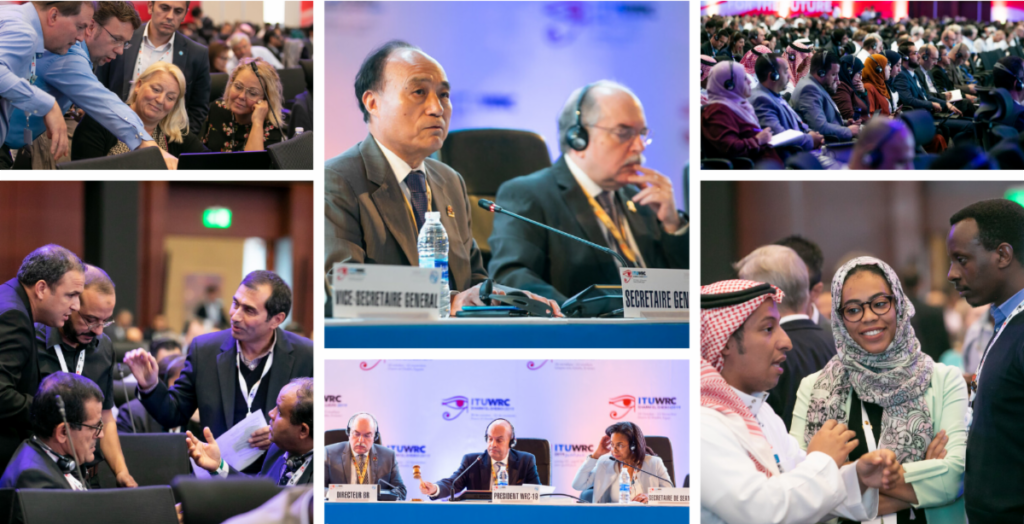The World Radiocommunication Conference 2019 (WRC-19) concluded today as agreements signed by some 3400 delegates from around 165 Member States were enshrined in the Final Acts of the Radio Regulations, the international treaty governing the global use of radio-frequency spectrum and satellite orbits.
Additional spectrum allocations agreed for IMT-2020 (5G mobile)
Earth monitoring and space research satellite services protected
WRC-19 identified additional globally harmonized (millimetre wave) frequency bands for International Mobile Telecommunications (IMT), including IMT-2020 (otherwise known as 5G mobile), facilitating diverse usage scenarios for enhanced mobile broadband, massive machine-type communications and ultra-reliable and low-latency communications. This will unlock a host of applications facilitating Intelligent Transport Systems, creating smart cities and making communities more sustainable while allowing for effective climate action, improved health care, sustainable agricultural practices, and greater energy efficiency.
At the same time, protections were accorded to the Earth-exploration satellite service (EESS) as well as meteorological and other passive services in adjacent bands, such as the space research service (SRS) to ensure that space-based monitoring of the earth and its atmosphere remain unhindered. Satellite services supporting meteorology and climatology that aim to safeguard human life and natural resources will be protected from harmful radio-frequency interference, as will systems used by radio astronomers for deep space exploration.
Steps were also taken to ensure that radio astronomy stations would be protected from any harmful radio interference from other space stations or satellite systems in orbit.
“WRC-19 paves the way for new, more innovative ways to connect the world using both terrestrial and space-based communication technologies,” said ITU Secretary-General Houlin Zhao. “As leading edge broadband technology manifests itself in new industrial developments, people in the remotest areas will also get better and more affordable access.
“The hard won agreements at WRC-19 will favourably impact the lives of billions of people around the world, creating a digital landscape for sustainable growth and development,” said Mr Mario Maniewicz, Director of the ITU Radiocommunication Bureau. “The achievements of WRC-19 in enabling new communication technologies and the protection of existing services will be reflected in the continuous growth of the trillion dollar telecommunication and ICT industry.”
The deliberations at WRC-19 were steered by conference Chairman Amr Badawi with assistance from six Vice-Chairmen: Mr Kyu Jin Wee (Republic of Korea), Mr Tareq Al Awadhi (United Arab Emirates), Mr Peter Zimri (South Africa), Mr Alexander Kühn (Germany), Ms Grace Koh (United States) and Mr Sergey Pastukh (Russian Federation).
KEY OUTCOMES OF WRC-19
-
Additional bands for IMT identified in the 24.25-27.5 GHz, 37-43.5 GHz, 45.5-47 GHz, 47.2-48.2 and 66-71 GHz bands, facilitating development of fifth generation (5G) mobile networks.
-
Earth exploration-satellite (EESS) service – Protection accorded to EESS with the possibility of providing worldwide primary allocation in the frequency band 22.55-23.15 GHz in order to allow its use for satellite tracking, telemetry and control.
-
Non-Geostationary Satellites – Regulatory procedures established for non-geostationary satellite constellations in the fixed-satellite service, opening the skies to next-generation communication capabilities. Mega-constellations of satellites consisting of hundreds to thousands of spacecraft in low-Earth orbit are becoming a popular solution for global telecommunications, as well as remote sensing, space and upper atmosphere research, meteorology, astronomy, technology demonstration and education.
-
Regulatory changes introduced to facilitate rational, efficient and economical use of radio frequencies and associated orbits, including the geostationary-satellite orbit.
-
High-altitude platform stations (HAPS) – Additional frequency bands Identified for High Altitude Platform Systems – radios on aerial platforms hovering in the stratosphere – to facilitate telecommunications within a wide coverage area below for affordable broadband access in rural and remote areas.
-
WiFi networks – Regulatory provisions revised to accommodate both indoor and outdoor usage and the growth in demand for wireless access systems, including RLANs for end-user radio connections to public or private core networks, such as WiFi, while limiting their interference into existing satellite services.
-
Railway radiocommunication systems between train and trackside (RSTT) – Resolution approved on Railway radiocommunication systems to facilitate the deployment of railway train and trackside systems to meet the needs of a high-speed railway environment in particular for train radio applications for improved railway traffic control, passenger safety and security for train operations.
-
Intelligent Transport Systems (ITS) – ITU Recommendation (standard) approved to integrate ICTs in evolving Intelligent Transport Systems (ITS) to connect vehicles, improve traffic management and assist in safer driving.
-
Broadcasting-satellite service (BSS) – Protection of frequency assignments, providing a priority mechanism for developing countries to regain access to spectrum orbit resources.
- Global Maritime Distress and Safety System (GMDSS) – Expanded coverage and enhanced capabilities for GMDSS.
- Earth stations in motion (ESIM) – The decision on ESIMs will connect people while in planes, ships, and trains to communication links with geostationary satellites.
VISION 2023: A LOOK INTO SOME AREAS OF THE WRC-23 AGENDA
VISION 2023: A LOOK INTO SOME AREAS OF THE WRC-23 AGENDA
- Earth stations in motion (ESIM) – Conditions to be further defined for communications of ESIMs with non- geostationary space stations in the fixed-satellite service to provide reliable and high-bandwidth Internet services to aircraft, ships and land vehicles.
- High-altitude IMT base stations (HIBS) – Possible use of same frequency bands as ground-based IMT base stations on HAPS for extended mobile broadband connectivity to underserved communities and remote areas.
- Aeronautical mobile applications – Modernizing aeronautical HF radio, new non-safety aeronautical mobile applications for air-to-air, ground-to-air and air-to-ground communications of aircraft systems, and possible new allocations to the aeronautical mobile satellite service to support aeronautical VHF communications in the Earth-to-space and space-to-Earth directions.
- Global Maritime Distress and Safety System (GMDSS) – Improved communications and additional spectrum and satellite resources to enhance maritime capabilities in GMDSS, such as e‑navigation. https://www.itu.int/en/mediacentre/Pages/2019-PR24.aspx
www.delreport.com
